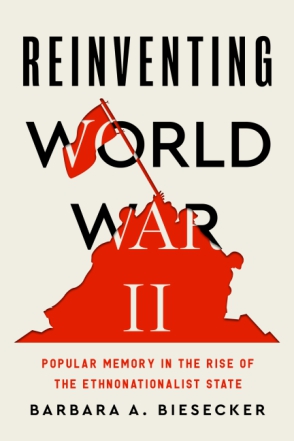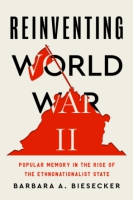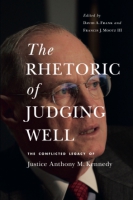
Reinventing World War II
Popular Memory in the Rise of the Ethnonationalist State
Barbara A. Biesecker
Reinventing World War II
Popular Memory in the Rise of the Ethnonationalist State
Barbara A. Biesecker
“Reinventing World War II is an incisive, theoretically sophisticated, and well-argued critique ranging from the culture wars of the 1980s and 1990s through popular culture’s invocation of WWII memory as a palliative. This historical critique is brought to bear in a summative—and sobering—commentary on the extreme political polarization of the present moment. A must-read for cultural/rhetorical critics and memory scholars and those concerned about the current state of political discourse in the United States.”
- Description
- Reviews
- Bio
- Table of Contents
- Sample Chapters
- Subjects
Biesecker analyzes prominent cases of World War II remembrance, including the canceled exhibit of the Enola Gay at the National Air and Space Museum in 1995 and its replacement, Steven Spielberg’s Saving Private Ryan, Tom Brokaw’s The Greatest Generation, and the United States Holocaust Memorial Museum. Situating these popular memory texts within the culture and history wars of the day and the broader framework of US political and economic life, Biesecker argues that, with the notable exception of the Holocaust Memorial Museum, these reinventions of the Good War worked rhetorically to restore a strong sense of national identity and belonging fitted to the neoliberal nationalist agenda.
By tracing the links between the popular retooling of World War II and the national state fantasy, and by putting the lessons of Foucault, Derrida, Lacan, and their successors to work for a rhetorical-political analysis of the present, Biesecker not only explains the emergence and strength of the MAGA movement but also calls attention to the power of public memory to shape and contest ethnonational identity today. This book will interest rhetoricians and historians as well as students and scholars in the fields of US politics and communication studies.
“Reinventing World War II is an incisive, theoretically sophisticated, and well-argued critique ranging from the culture wars of the 1980s and 1990s through popular culture’s invocation of WWII memory as a palliative. This historical critique is brought to bear in a summative—and sobering—commentary on the extreme political polarization of the present moment. A must-read for cultural/rhetorical critics and memory scholars and those concerned about the current state of political discourse in the United States.”
“Biesecker, one of rhetoric’s leading scholars, masterfully weaves together rhetorical theory and contemporary philosophy to provide an insightful reading of the ways the memories of World War II helped shape the neoliberal fantasy of the modern ethnonational state. A compelling analysis for anyone interested in memory, neoliberalism, or contemporary rhetorical theory.”
Barbara A. Biesecker is Professor in the Department of Communication Studies at the University of Georgia. She is the author of Addressing Postmodernity: Kenneth Burke, Rhetoric, and a Theory of Social Change and coeditor of Rhetoric, Materiality, and Politics.
List of Illustrations
Acknowledgments
Introduction
1. The Enola Gay Controversy: The Politics of Experience and Truth Telling at the Turn of the Twenty-First
Century
2. Popular Memory and Civic Belonging at the End of the American Century
3. Remembering the “Good War” / Refiguring Democracy: Ethico-Political Resubjectivation at the United States Holocaust Memorial Museum
4. The Culture and History Wars of the Twenty-First Century, or, Can You Be white and Look at This?
Notes
Bibliography
Index
Download a PDF sample chapter here: Introduction
Mailing List
Subscribe to our mailing list and be notified about new titles, journals and catalogs.






